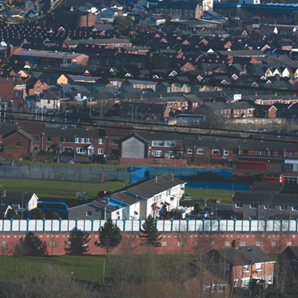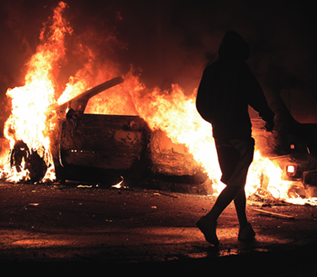Draft CSI strategy
 Two and a half years on from the Programme for Government’s publication, the cohesion, sharing and integration, programme replaces ‘A Shared Future’ from the days of direct rule.
Two and a half years on from the Programme for Government’s publication, the cohesion, sharing and integration, programme replaces ‘A Shared Future’ from the days of direct rule.
Published in draft form by OFMDFM on 27 July, it is the first community relations strategy drawn up by a power-sharing government. However, the long delay in its production and the very public differences of opinion in autumn 2008, when the DUP and Sinn Féin published rival drafts, suggest that it may not achieve all its aims.
Jointly launching the document, Peter Robinson reflected that “we have all come a long way in the past decade” and it was important to “now build on the good work that has already been achieved”.
Martin McGuinness referred to recent “events within our community”, presumably the rioting in Ardoyne and elsewhere, which emphasised the importance of “dialogue, agreement and joint working.” All of society needed to tackle the problems involved, especially hate crime, not government alone.
Unlike Robinson, McGuinness frequently referred to equality, which illustrates the major difference between the DUP and Sinn Féin.
Sinn Féin claims that inequality between nationalists and unionists caused the Troubles and that a ‘levelling out’ between the two blocks is still needed. According to the DUP, the Troubles themselves are the main cause as community relations deteriorated and therefore those relations have to be improved. The parties’ views reflect wider thinking in both communities.
The language of the 77-page document is cautious, tending to speak of issues to address rather than problems to solve.
CSI is the first of a “family of policies” seeking to tackle prejudice and hate. The others will promote “equality, fairness, rights, respect and responsibility” for all the groups mentioned in section 75 of the Northern Ireland Act.
Administration
A ‘panel for cohesion, sharing and integration’ would be established and led by the OFMDFM ministers. This would monitor how the CSI programme is implemented and also hold government to account on “equality, fairness, inclusion and good relations”.
- Housing Executive
- NILGA
- PSNI
- Racial Equality Forum
- Youth Justice Agency
- Community organisations
Panel members will recommend specific areas for action by ministers. Fourteen themes are identified.
Short-term suggestions include developing “shared space”, better crisis intervention when violence and hate crime happens, and earlier action to tackle tensions at interfaces. In the medium term, best practice could be shared wherever it is needed and the new parades framework could further ease tensions.
Dealing with flags, murals, bonfires and interfaces would take place only in the long-term. Encouraging shared neighbourhoods is also in this category, as well as “reducing and eventually eliminating” segregated services.
A separate advisory panel or arm’s length body would provide expert advice and guidance. The Community Relations Council could fulfil this role but some other options see it being abolished. A funders’ group is also envisaged, to make the best use of available money.
Councils are important for improving good relations as they are close to the people they service. Existing good relations work will continue and they will be consulted on the criteria for new funding projects.
Extensive use is made of Northern Ireland Life and Times Survey statistics.
The desired changes in society are summarised under two general headings: people and places.
People
The vast majority of people want to work in shared workplaces (92 per cent) and a smaller majority prefer mixed religion schools (62 per cent).
Robust anti-discrimination and equality legislation is already in place. Private sector employers are encouraged to make their workplaces “diverse, welcoming and shared environments.”
In education, the role of integrated sector schools is recognised, although the document does not say that these account for just 61 of Northern Ireland’s 1,223 schools.
“Poverty and disadvantage” is a constant factor in most interface areas and the ministers are determined that “no community is left behind”. Tensions can still deter foreign investment.
Health and leisure services should not be duplicated, especially due to the financial pressure. People need to feel safe enough to use services outside their own neighbourhood. No similar commitment is made for schools.
Places
Mixed religion neighbourhoods are consistently popular: 80 per cent of people would like to live in one. The DSD is considering changes to the common selection scheme for social housing and in the meantime, each new social housing scheme is being screened for its “shared potential”. The Shared Neighbourhood Scheme is being piloted in 30 estates across the province.
Not enough is being done to tackle sectarian symbols, according to 88 per cent of respondents. OFMDFM says it is still committed to “working with people in the community” to remove paramilitary flags and murals, and racist and sectarian graffiti. The flags protocol, which states how offensive flags should be removed, will be reviewed after CSI is finalised.
All public spaces should be shared and welcoming, it states. This does not mean “neutralising” these areas but creating a “good and harmonious environment” where no-one feels threatened. This also means ending the “unnecessary duplication of services”.
One public service is already designed in a shared way. DCAL makes sure that libraries are built in places that can reach both communities.
Youth
As in the past, some young people make “flawed judgements” and become involved in disorder and violence. Positive alternatives are needed.
The Department of Justice will develop a long-term plan to stop young people taking part in hate crime. Meanwhile, the Department of Education is preparing a new ‘community relations, equality and diversity in education’ policy. Schools are also encouraged to see their premises as places for the whole community to use.
More research into the needs of NEETs (i.e. young people not in education, employment or training) is also being carried out by DEL.
Culture
All sections of the community should “feel comfortable expressing and sharing their cultural identity” but those sections need to understand others’ cultures in a better way. This should help to prevent attacks on GAA and Orange halls.
Community festivals are praised for helping to reduce tensions over the summer months. Culture is also closely connected to tourism, where there is “considerable scope” for more jobs and attractions. Tensions deterred visitors and they had to be reassured that Northern Ireland was a “safe and welcoming place for all”.
Separately, OFMDFM has drafted the Public, Assemblies, Parades and Protests Bill, which aims to tackle parading problems at a local level. DCAL’s regional and minority languages strategy will also focus on a shared future, when it is published.
Security
Peace walls are the most visible sign of division. Although their removal is described as a key government priority, any solution will be slow. Local communities must be “involved, consulted and supported”. Safety and security are vital.
Around a quarter of Protestants and Catholics say they would avoid working in an area dominated by the other community. PSNI statistics also show that there were 245 more sectarian incidents and 45 more racist incidents in 2009-2010 than in the previous year.
It is up to local communities to remove graffiti and paramilitary symbols, the document says. The forthcoming Justice Bill will, though, legislate against sectarian behaviour at sports grounds. Crime reduction partnerships, when introduced, will be required to consider good relations.
Cohesion
A cohesive community refers to how new arrivals to Northern Ireland fit into its society. Zero tolerance for racism or hate crime is emphasised.
As the Programme for Government stated, the arrival of new migrants was changing society and could help to encourage mixing. CSI re-affirms the outgoing racial equality strategy and OFMDFM is “open to proposals” about how it can be strengthened.
Immigration, of course, influences a society’s ethnic mix and the Executive will lobby the UK Government for an immigration policy that works for Northern Ireland and “takes full account of our different skills, needs and concerns.”
In particular, ministers want to ensure that destitute immigrants received proper welfare support, as they sometimes “slip through the safety net”. Legislation may be needed in Parliament.
Reaction
Alliance had entered the Executive on the condition that progress would be made on a shared future. Stephen Farry welcomed the publication but also pointed out weaknesses. He hopes for improvements after the consultation takes place.
“Addressing the continued deep divisions in Northern Ireland through building a shared future is the biggest challenge facing this society,” he warned. The document was “deficient and flawed” in its lack of clarity and detail, including on the cost of division and how it would be delivered.
The DUP’s official comment was made through Peter Robinson’s statement.
Sinn Féin’s Martina Anderson was fiercely critical of “unelected, unnecessary and ineffective good relations quangos” and hoped to see them abolished: “Sectarianism and intolerance are still rife in our society so I have to ask just what exactly have these organisations delivered?”
Anderson saw equality as “the foundation of good relations”, adding that the publication marked “the beginning of a dialogue about the type of society we would like to see.”
OFMDFM Committee Chairman Danny Kennedy cautioned that, as it stood, the document “contains some positive sound bites” but was unlikely to deliver a shared future: “Whilst I recognise that bringing about a shared future should be an organic process, without some goals it will be extremely difficult to make or measure progress.”
Speaking for his party, Kennedy was not convinced that the DUP and Sinn Féin had moved beyond the “separate but equal” position. His preference was “tolerant and pluralist”, like most of the UK.
The SDLP thinks the document does little to deal with sectarianism. Spokesman Conall McDevitt commented that this needed to be seen as the “real enemy” with government leading the fight against it.
Steven Agnew, for the Greens, found it “light on detail”, containing “lots of visions and little of substance.” Gay rights groups have criticised the lack of detail on their calls for equality but it promises a separate sexual orientation strategy.
The public consultation runs to 29 October. Ten public meetings will be held in September and responses can be made in writing to OFMDFM. The schedule allows little time to finalise the strategy before the Christmas recess but it would need to be agreed before the Assembly elections next May.
CSI is one of the most important consultations ever undertaken in Northern Ireland, according to the Community Relations Council, which will be making a detailed response.
Chief Executive Duncan Morrow felt it needed to be “much more substantial” and described a “shared and reconciled society” as the best way forward for Northern Ireland.





